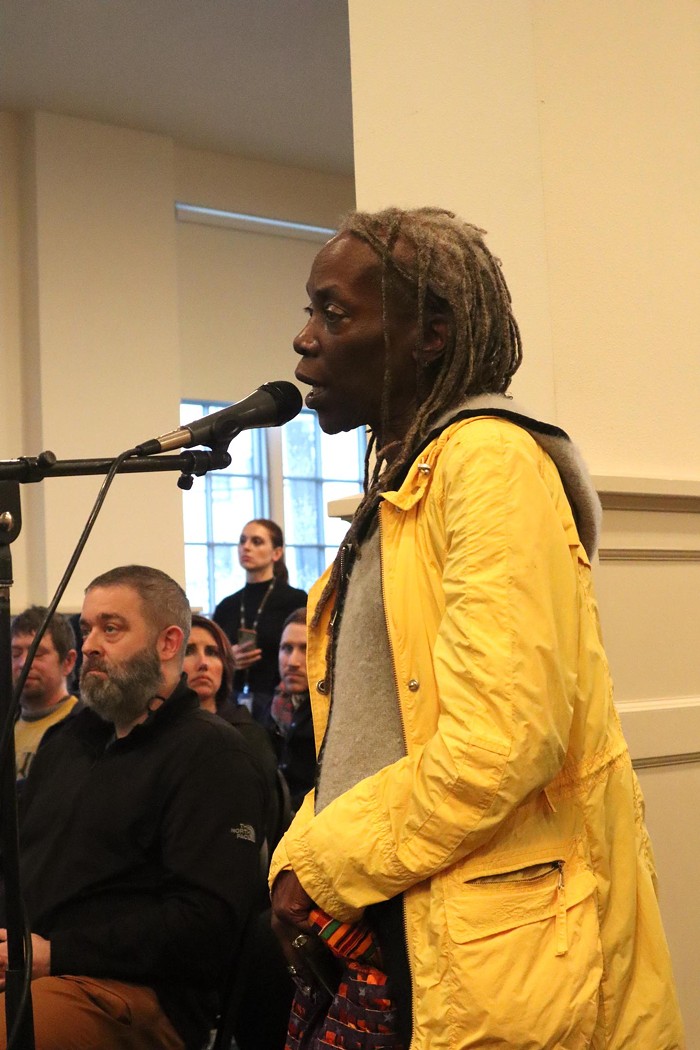In February 2021, the city’s first alternative, non-police emergency response team, Portland Street Response (PSR), was launched after two years of planning and advocacy. By February 2023, its future was in jeopardy.
As uncertainty around funding and future leadership hangs over PSR, the public has a plea for city hall: Fund, expand, and stabilize the program.
Dozens of people filed into Southeast Portland’s Melody Center Wednesday, March 27, for a call to action on how to save PSR. Dozens more tuned in remotely, filling a Zoom chat window with more than 100 comments. The Portland Committee on Community Engaged Policing (PCCEP) hosted the town hall, soliciting public input as the committee prepares recommendations regarding PSR for Mayor Ted Wheeler. The mayor will have 60 days to respond to PCCEP’s recommendations.
PCCEP asked for input on what relationship, if any, PSR should have with the police bureau, fire bureau and Community Health Assess & Treat (CHAT) program. CHAT is a team within the fire bureau that responds to low acuity, non-emergency medical calls. Attendees were also asked to weigh in on where PSR should be administratively housed within the city, and what changes to the public wouldn’t support.
Several participants said the city would be best served if PSR expanded its hours of operation, as initially planned. Others said the program’s workers should be allowed to enter residences and other indoor areas to respond to calls when asked, which they’re currently prohibited from doing. Nearly every person who spoke testified about the value of the program.
Melissa Trombetta works for Oregon’s Department of Public Safety Standards and Training (DPSST), the state agency responsible for training and certifying law enforcement employees. Trombetta, who noted she wasn’t speaking on behalf of the agency, rather, from her own observations, said having a team to respond to people in need of mental health help is viewed as an asset by police.
“I have trained thousands of police officers throughout our state on de-escalation and basic behavioral health detection,” Trombetta said. “I've seen the expansion of our program here and I'm here to say that of the thousands of police officers I have trained, every single one of them has specifically said–and this is from around the state, ‘I wish we had somebody that could come to these behavioral health calls because we are not equipped.’ …There are people around the state who envy this [program], so the thought that it would not be appropriately funded and expanded is pretty much beyond me.”
The public outcry and town hall follows a year of management shake ups, changing directives, and most recently, a proposal from the city’s fire bureau, currently overseen by City Commissioner Rene Gonzalez, to cut roughly a third of PSR’s annual funding, to make up for a funding shortfall at Portland Fire & Rescue.
Since Gonzalez took office in 2023 and was assigned oversight of the fire bureau, which houses PSR, he’s clamped down on the program’s aid to the unhoused. Despite rising call volume and requests for alternative responders, Gonzalez and fire bureau leaders initiated a hiring freeze and budget constraints at PSR, saying the program grew too fast and wasn’t following city purchasing guidelines. Later, a city audit revealed the commissioner and fire bureau leadership toyed with the idea of foisting the program onto Multnomah County, to get it out of the fire bureau.
The rapid changes gave a public perception that PSR was being sabotaged by external leadership. Last summer, a community group called Friends of Portland Street Response was launched, delivering a petition with more than 10,000 signatures to city leaders, asking for guaranteed funding and resources for the program.
Seven months later, the group says it’s gotten no traction with Gonzalez and no reassurance of PSR’s future stability.
Stephanie Howard, Portland’s director of community safety, vowed city leaders would find the money to maintain the program.
“One of my biggest goals for tonight is to try to express as clearly as I can, just how much support there is in city hall, and the mayor’s office in particular, for this program,” Howard told the crowd. “I really want people to take away from this that there is an absolute sincere commitment to stabilizing this program, to making it successful, and to try to make sure that it is positioned in the best way to serve the community.”
PCCEP’s town hall saw a bevy of city council candidates line up to lay out recommendations, and affirm their support. It also elicited testimony from a former council member–the one who helped launch PSR.
Jo Ann Hardesty, a former city commissioner, said city leaders aren’t tapping available Medicaid funding for PSR that would allow the program to operate full time.
“When we envisioned Portland Street Response, we envisioned it doing exactly what it does today, but we envisioned it 24 hours a day, seven days a week for our most vulnerable community members,” Hardesty said. “The city could have, over a year ago, made Portland Street Response eligible for federal Medicaid funding, and because of poor leadership, that 80 percent reimbursement rate that the federal government, that Ron Wyden and I worked on together to get, is just sitting there languishing.”
A recent city audit also mentioned the program's eligibility for Medicaid dollars, if it were to operate 24 hours a day in the city.

the Portland Street Response program she helped launch in 2021. courtney vaughn
These days, Hardesty stays out of the political fray, but with the future of the program she helped build hanging in the balance, she had fervent remarks for city council.
“Not too many things get me out of my house nowadays, but saving Portland Street Response is one of those,” she said. “I’ve been hearing long before I left city council how much the city supports Portland Street Response, but you put your money where it matters, and clearly Portland Street Response does not matter to the current Portland City Council.”
Hardesty said she looks forward to January 2025, “when hopefully we’ll have real leaders that really care passionately about the people with the least resources in our city.”
PCCEP is expected to submit its recommendations to the mayor’s office after its next meeting on April 17.




















